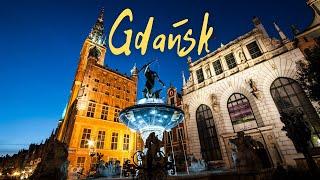
A Night in Gdańsk Old Town | Poland
Комментарии:

54 zloty for a beer in Gdansk they saw you coming mate
Ответить
Pomeranian dukes - rulers of Pomerania since at least the 11th century. The bishopric of Kołobrzeg, established in 1000 under the state of the first Piast dynasty, (the first Polish state ruled by the Piast dynasty) was destroyed around 1007. The Piast state fell apart in the 1130s, but was reunited by Casimir the Restorer, who won several battles with the Pomeranians in 1047. According to the chronicle of Gallus Anonymus, King Bolesław the Bold lost control of Pomerania. The first written trace of the Pomeranian rulers is a mention from 1046 about Duke Siemomyśl (Zemuzil dux Bomeranorum). The Chronicle of Gallus Anonymus (written in 1113) mentions several Pomeranian dukes: Swietobor, Gniewomir and an unnamed prince besieged in Kołobrzeg. As a result of three military campaigns in 1116, 1119 and 1121, all of Pomerania was taken over by the Polish duke Bolesław Wrymouth and divided into four parts: Gdańsk Pomerania with Gdańsk came under the direct control of Poland, where Duke Bolesław appointed his governor; Central Pomerania with Słupsk and Sławno became a Polish fief ruled by Duke Racibórz, and Western Pomerania with Kamień, Kołobrzeg and Białogard became a Polish fief ruled by Duke Warcisław. Szczecin and Wolin were semi-independent city republics under the rule of the Polish prince. The Polish governors of Eastern Pomerania gradually transformed into semi-independent dukes who ruled until 1294. They were subject to Poland and Denmark at various times. The Duchy was periodically divided into districts with capitals in Gdańsk, Białogard, Świecie, Lubiszewo and Tczew. Warcisław I, the Duke of Western Pomerania, became the progenitor of the Griffin dynasty, which ruled the duchy until 1637. The dukes managed to collect various territories on both sides of the Oder River, and therefore at various times they were vassals of Poland and the Roman Empire. The Duchy was periodically divided into districts with capitals in Szczecin, Wołogoszcz, Bardo, Darłowo, Dymin, Słupsk and Stargard.
Ответить
hi, many tourists think that gdansk is a german city but it is only a part of the truth, as a Polish patriot I am obliged to bring facts about the history of gdansk, I know that for many people history is boring but it is undoubtedly important, I warn you that there will be a lot of reading, so I will divide the text into two comments :) I watched your videos earlier I hope you will visit a few more places in Poland greetings and now I encourage everyone interested to read
The beginnings of Gdańsk date back to the year 980. Shortly before the Easter of 997, a bishop from Bohemia, the missionary Wojciech, also known as Adalbert, appeared in these parts. Soon he died at the hands of the pagan Prussians, and his life and death were described by a Benedictine monk from the Aventine monastery - Jan Kanapariusz. It was he who noted the words urbs Gydannyzc - referring to the city of Gdańsk, where the saint was to baptize a large number of converts. It is also the first written mention of the town on the Motława River. The stronghold, city and port complex began to form in earnest in the second half of the tenth century. In Gdańsk, ruled by the dynasty of Pomeranian dukes, the native Slavic population coexisted with ever-increasing numbers of merchants and craftsmen arriving from the west. Thanks to the efforts of Prince Swietopelk II the Great, Gdańsk was granted town (Lubeck) rights. The son of this ruler, the last prince of Gdańsk Pomerania - Mściwoj II, also called Mestwin, by virtue of the act concluded in 1282 in Kępno, handed over his land to the prince of Greater Poland - Przemysł II. It was an act of great political importance, as it enabled the unification of Polish lands. During the period of chaos that prevailed in Gdańsk after the death of Wacław Czeski, castellan Bogusz called for help from the Teutonic Knights. After taking over the castle in 1308, the knights of the Order carried out a pogrom here, which went down in history as the "Gdańsk slaughter".
For a long time and with determination, the inhabitants of Gdańsk sought to free themselves from the Teutonic rule. It is worth remembering, however, that in the times of the Order's supremacy over the city, a the Radunia canal, and the Great Mill, which still exists today - the most powerful secular building in the port city. Gdańsk's membership in the Union of Hanseatic Cities (1361-1669) also brought measurable benefits, both during the Teutonic rule and after the conclusion of the Peace of Toruń. The city was compared to a lion, bravely guarding the Hanseatic granary. After the military defeat of the Teutonic Knights at Grunwald (1410), Gdańsk is in favor of the Polish king. However, the Order's reign in the city on the Motława River will not end until 1454. The Teutonic Knights are expelled. King Kazimierz Jagiellończyk not only incorporates Gdańsk into the Crown, but also grants its inhabitants numerous privileges, the most important of which, called "the Great", is signed on May 15, 1457. The city is enriched with great goods, previously owned by the Order. The city authorities and local merchants receive numerous powers. In the coat of arms of the city, above the two crosses, the royal crown of the Jagiellonians (Polish Dynasty) will be visible from now on

Great night in Poland 🇵🇱
Ответить
What a wonderful city Mark and a great video. I went to Gdansk more than a decade ago and it still looks like I remember it. In my view, Dluga Street has a strong claim to the title of 'Most Beautiful Street in the World'!
Ответить
Thanks for Gdansk tour Great video Bravo 👏👏👏
Ответить
Great one Mark! A horse playing piano! Epic!😂Game Over looks like an amazing place to have some drinks. Could you play games there as well? Gdansk is a very beautiful city.
Ответить

























